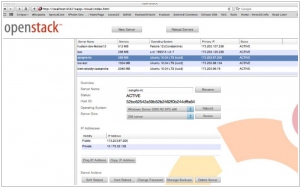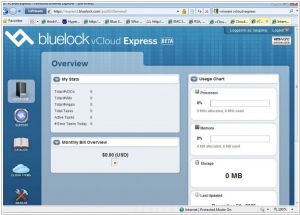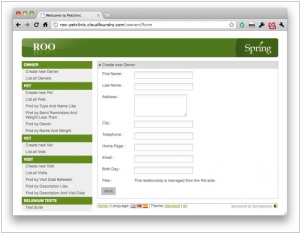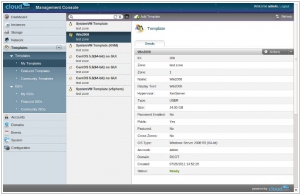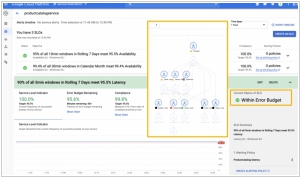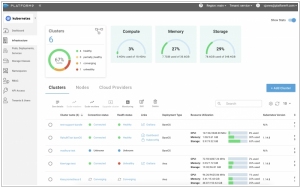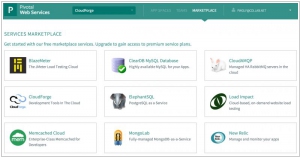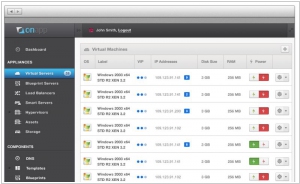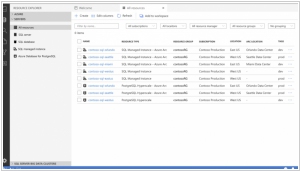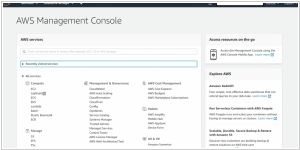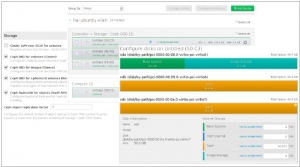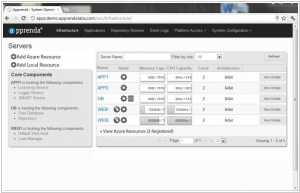Top 10 Private Cloud and Hybrid Cloud platforms
April 25, 2024 | Editor: Michael Stromann
23
Private cloud platforms provide organizations with dedicated infrastructure and resources for hosting and managing their own cloud environment. These platforms offer enhanced control, security, and customization options, allowing businesses to leverage cloud computing benefits while maintaining data privacy and compliance requirements, making them ideal for industries with strict regulatory standards or organizations seeking greater control over their cloud infrastructure.
1
OpenStack is a global collaboration of developers and cloud computing technologists producing the ubiquitous open source cloud computing platform for public and private clouds. The project aims to deliver solutions for all types of clouds by being simple to implement, massively scalable, and feature rich. The technology consists of a series of interrelated projects delivering various components for a cloud infrastructure solution.
2
Start moving toward secure cloud computing with VMware vCloud solutions and services. Leverage the power of cloud computing while retaining the flexibility and open standards to support your existing IT infrastructure. Enabling IT as a service through cloud computing gives you a more efficient, flexible and cost-effective model.
3
Open Source Cloud Application Platform that makes it faster and easier to build, test, deploy and scale applications, providing a choice of clouds, developer frameworks, and application services. It is an open source project and is available through a variety of private cloud distributions and public cloud instances.
4
Apache CloudStack is open source software designed to deploy and manage large networks of virtual machines, as a highly available, highly scalable Infrastructure as a Service (IaaS) cloud computing platform. CloudStack is used by a number of service providers to offer public cloud services, and by many companies to provide an on-premises (private) cloud offering, or as part of a hybrid cloud solution.
5
Anthos is an open application modernization platform that enables you to modernize your existing applications, build new ones, and run them anywhere. Built on open source technologies pioneered by Google—including Kubernetes, Istio, and Knative—Anthos enables consistency between on-premises and cloud environments.
6
The power of the public cloud on infrastructure of your choice. Run Kubernetes and cloud native technologies on public, private and edge clouds. Public clouds are walled gardens, and DIY is difficult and time-consuming. Platform9 offers a third option—an open and faster option—enabling a better way to go cloud-native.
7
Pivotal is the leading enterprise PaaS, powered by Cloud Foundry. It delivers an always-available, turnkey experience for scaling and updating PaaS on the private cloud. Pivotal is enabling the creation of modern software applications that leverage big & fast data – on a single, cloud independent platform.
8
OnApp software enables Infrastructure-as-a-Service for hosts, telcos and other service providers. With OnApp in your datacenter you can use commodity hardware to sell public & private cloud services, dedicated servers, Virtual Private Servers, CDN, DNS, storage and much more, through one fully automated control panel.
9
Cloud platform for customers who want to simplify complex and distributed environments across on-premises, edge and multicloud, Azure Arc enables deployment of Azure services anywhere and extends Azure management to any infrastructure.
10
Run AWS infrastructure and services on premises for a truly consistent hybrid experience
11
Mirantis is the number one pure-play OpenStack Company. We deliver technology, integration, training and support to succeed. OpenStack without the compromises of vendor lock-in. 400+ open source infrastructure experts makes us one of top 5 contributors.
12
Apprenda is a software layer that transforms any infrastructure into a policy-driven, hybrid cloud application platform (PaaS). We empower enterprises to build the best next generation applications faster, using today's skill-sets & investments. PaaS should make it easier to write the first line of code rather than only add value after the last line is written.
Latest news about Private Cloud and Hybrid Cloud platforms
2022. Platform9 raises $26M to help manage distributed cloud clusters
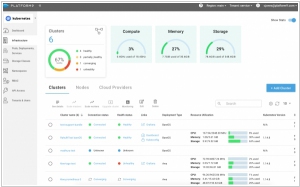
Platform9, a self-proclaimed "open distributed cloud company," has successfully concluded a funding round, securing $26 million. Platform9 offers open-source virtualization products that enable developers to utilize Kubernetes, an open-source platform for managing self-contained workloads, and other cloud-native technologies on distributed cloud services. By leveraging existing infrastructure, Platform9 facilitates the creation of cloud-native clusters equipped with monitoring capabilities and seamless integration with third-party tools. In this context, a "cluster" refers to a collection of worker machines, known as nodes, that execute containerized applications along with their requisite dependencies and services.
2020. Microsoft brings data services to its Arc multi-cloud management service
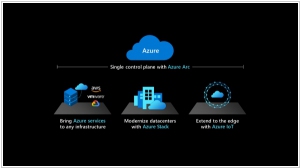
Microsoft has introduced a significant update to its Arc multi-cloud service, empowering Azure customers to operate and oversee workloads across various clouds, including those offered by Microsoft's competitors, as well as their on-premises data centers. Initially unveiled at Microsoft Ignite in 2019, Arc was designed not only to assist users in managing their servers but also to enable them to run data services such as Azure SQL and Azure Database for PostgreSQL in proximity to their data. Today, the company fulfills this commitment by launching a preview version of Azure Arc-enabled data services, which unsurprisingly includes support for Azure SQL and Azure Database for PostgreSQL. Furthermore, Microsoft has made the core feature of Arc, Arc-enabled servers, generally accessible. These tools form the foundation of the service, empowering enterprises that employ the standard Azure Portal to administer and monitor their Windows and Linux servers throughout their multi-cloud and edge environments.
2020. Azure Arc brings its Kubernetes service into public preview
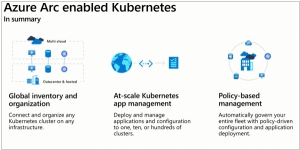
Microsoft has unveiled that Azure Arc, its cloud resource management service designed to operate across various environments, including rival clouds such as AWS and GCP, as well as platforms like Red Hat's Open Shift, is introducing Azure Arc-enabled Kubernetes in its public preview. This update empowers users to configure and oversee Kubernetes clusters across their data centers, edge locations, and public clouds. Additionally, Microsoft announced the inclusion of support for SUSE Linux Enterprise Server and the SUSE CaaS Platform within Azure Arc's capabilities.
2019. VMware completes $2.7 billion Pivotal acquisition
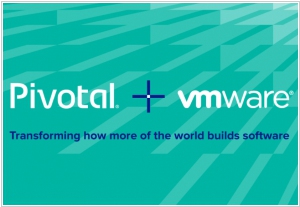
VMware has successfully completed the $2.7 billion acquisition of Pivotal, a private cloud platform. This acquisition serves as another crucial step for VMware as it strives to transition from solely a virtual machine company to a cloud-native provider capable of managing infrastructure across various environments. This addition aligns with VMware's recent acquisitions of Heptio and Bitnami, further reinforcing its strategic vision. The ultimate goal is to seamlessly integrate these developments into VMware Tanzu, a comprehensive management platform designed to unify Kubernetes containers and VMware virtual machines.
2019. AWS Outposts brings Amazon cloud to data center
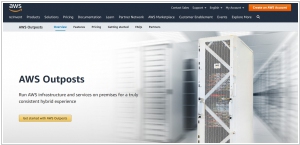
Amazon has officially launched Outposts, a private cloud hardware stack that can be installed in your own data center. Certain workloads, such as factory operations, require close proximity to compute resources due to low-latency requirements. Outposts aims to address this need, distinguishing itself from existing solutions by providing a seamless connection between on-premises hardware and the cloud. The hardware stack is equipped with a comprehensive range of services, including Amazon Elastic Compute Cloud (EC2), Amazon Elastic Block Store (EBS), Amazon Virtual Private Cloud, Amazon ECS, Amazon Elastic Kubernetes Service, and Amazon EMR. With this move, Amazon joins Microsoft and Google, who already offer their own hybrid cloud solutions to customers: Azure Arc and Google Anthos, respectively.
2015. VMware will make Google Cloud Platform available to its customers
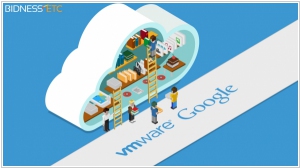
Google and VMware have joined forces to offer selected services from the Google Cloud Platform to VMware customers through vCloud Air, VMware's hybrid cloud platform. Later this year, vCloud Air users will gain access to Google's BigQuery analytics, Google Cloud Storage, as well as Google's Datastore and DNS services. Other Google services may also become available in the future. This collaboration can be seen as a win for both companies. VMware gains four valuable Google services, including the robust BigQuery analytics, which can help attract enterprise customers. Meanwhile, Google has the opportunity to showcase its top-notch intellectual property to the enterprise cloud users it seeks. Google aims to strengthen its hybrid cloud offerings, while VMware aims to demonstrate its cloud platform's compatibility with major players like Amazon Web Services (AWS).
2014. Apprenda teams with Piston to gain OpenStack support

Enterprise Platform as a Service provider Apprenda, initially focused on .NET and Windows for its Platform-as-a-Service offering but later expanded to include other languages and technologies, has formed a partnership with Piston Cloud, the developer of a private CloudOS, to align with the OpenStack ecosystem. Together, Apprenda and Piston will deliver an integrated solution that empowers agile software development teams to accelerate the creation of Java and .NET cloud applications and microservices within a truly hybrid cloud environment. Given the growing adoption of both PaaS and OpenStack solutions among enterprise developers, this collaboration presents a compelling joint solution.
2014. Mesosphere unveiled new data center OS
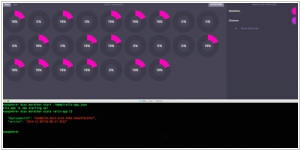
Mesosphere has officially launched its highly anticipated data center operating system, which is currently in private beta and is expected to be available to the general public in early 2015. This groundbreaking cloud OS, known as DCOS, addresses the complexity of treating all machines within a data center as a unified computing entity. Similar to how an operating system on a personal computer efficiently allocates resources to various applications, DCOS aims to accomplish the same feat across the entire data center. The inspiration behind this concept stems from the realization that modern data-intensive applications and services, such as Kafka, Spark, and Cassandra, span multiple servers, unlike traditional applications like Microsoft Excel. Configuring and managing each individual machine to support these new distributed applications can be overwhelming for developers and operations staff, as highlighted by Benjamin Hindman, co-creator of Apache Mesos and recent addition to the Mesosphere team.
2014. Mirantis gets $100M funding to become enterprise OpenStack leader
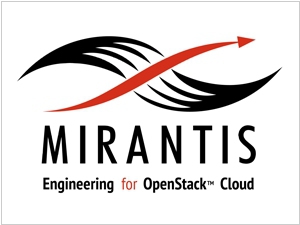
Commercial OpenStack distribution provider Mirantis has recently secured $100 million in Series B funding. OpenStack, known as an open source platform for infrastructure as a service deployment, serves as the foundation for Mirantis' ambitions. Much like Red Hat's relationship with Enterprise Linux, Mirantis aims to become the leading corporate representative for OpenStack. However, the competition in the enterprise OpenStack market is intense, with major players such as HP, IBM, Cisco, and Red Hat vying for a share. Interestingly, Red Hat recently announced its transition from client-server to cloud computing, with a specific focus on OpenStack, further intensifying the competition. Mirantis' significant funding injection will likely be crucial in establishing its presence and success in this competitive landscape.
2014. Microsoft Azure appliance makes comeback
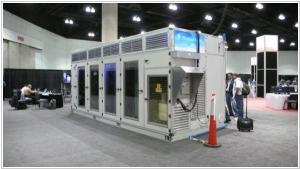
Microsoft is introducing a fresh Azure appliance that enables companies or service providers to implement it within their own data centers. Dubbed the Cloud Platform System, this novel appliance will operate using identical Azure APIs, services, hypervisor, and all other components as the Azure public cloud, while effortlessly establishing connections with the Azure public cloud. Notably, Microsoft's past exploration of Azure appliances adds to the appeal of this appliance. Previously, the company had contemplated selling appliances to select large service provider partners, like HP, and had even launched a program to assist web hosts in launching their own versions of Azure. However, both initiatives seemed to have been abandoned due to various business and technological factors. Nevertheless, the appliance has made a resurgence.
2014. PaaS platform Apprenda adds JBoss support
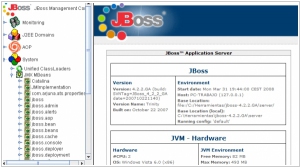
Apprenda, a company that supports a private Platform as a Service (PaaS) for running Java and Windows applications, is expanding its capabilities by introducing JBoss and Tomcat support. This integration allows for deeper integration with popular Java workloads. Initially, Apprenda focused on providing a Microsoft .NET-centric PaaS for businesses. However, the addition of Java support was a significant advantage for enterprise organizations that operate both Java and Windows applications. With JBoss support, Apprenda now competes more directly with Red Hat, the owner of JBoss, which promotes its OpenShift PaaS. Another player in the private PaaS market is Pivotal CF, which implements Cloud Foundry. Private PaaS solutions operate within a company's internal infrastructure or private cloud, in contrast to public PaaS offerings that rely on shared infrastructure like Amazon Web Services.
2014. HP buys Eucalyptus to link Openstack and Amazon Web Services
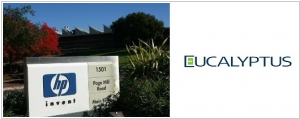
HP, a company that is strategically aligning its cloud approach with OpenStack, has made the decision to acquire Eucalyptus, a supporter of an alternative open-source cloud technology. Notably, Eucalyptus CEO Marten Mickos, who was previously recognized for expressing opposition towards OpenStack, will now assume the role of Senior Vice President and General Manager of HP's cloud Business, overseeing the company's cloud efforts. While specific details regarding integration plans were not disclosed by company executives, they emphasized the significant value that Eucalyptus brings to HP, particularly in terms of deploying private clouds that seamlessly interact with Amazon Web Services (AWS). The experience gained from these AWS "use patterns" is expected to be advantageous for HP as it continues to advance its vision of OpenStack-based private, public, and hybrid clouds within enterprise accounts. In the enterprise cloud market, HP faces competition from Red Hat and IBM on the OpenStack front, as well as from VMware and Microsoft in the realm of proprietary cloud solutions.
2014. VMware's cloud to support Docker, Google and Pivotal containers

VMware is collaborating with Docker, Google, and Pivotal to ensure seamless compatibility between container technology and its virtualization technology. This joint effort will enable developers and operations staff to utilize the Docker Engine alongside VMware's vSphere hypervisor and vCloud Air environment. VMware will also engage in collaborative projects with Docker on various open-source container initiatives within the Docker platform. The company is committed to ensuring that future Docker projects seamlessly integrate with the broader VMware platform. Additionally, VMware's software will effectively support Google's Kubernetes container management system. In its partnership with Pivotal, VMware has already been leveraging containers in conjunction with virtual machines as part of its application development platform since 2011.
2014. VMware integrates its cloud management tools with OpenStack
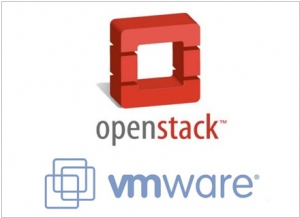
Virtualization giant VMware has announced the integration of its lineup of tools with the OpenStack open-source cloud framework. This new service is scheduled for release in the first half of 2015. With this integration, organizations that have an OpenStack cloud infrastructure in place will have the capability to manage it using VMware's tools through their IT operations staff. Additionally, organizations running data centers and equipment based on the VMware stack will be able to seamlessly synchronize them with other equipment running on OpenStack. It is worth noting that OpenStack was initially developed as an alternative to VMware's private cloud and Amazon's public cloud. VMware's Integrated OpenStack appears to challenge the idea held by OpenStack purists who prefer a private cloud built on multiple open-source components.
2014. Pivotal brings its cloud services to Mobile

Pivotal, the enterprise cloud platform, is introducing new services specifically tailored for mobile development, which complement the company's previously announced data services. The newly launched CF Mobile Service encompasses push notifications, an API gateway, and data-sync services. This service also provides IT departments with the ability to establish distinct policies and service level agreements to ensure that data remains within the enterprise's control. Pivotal CF is built upon the Cloud Foundry PaaS, which is an open-source platform. As a result, Pivotal CF supports a wide array of open-source tools, including various databases such as MongoDB, Riak, Apache Cassandra, and the Neo4j graph database, reflecting its rich heritage.
2014. GE becomes Big Data provider
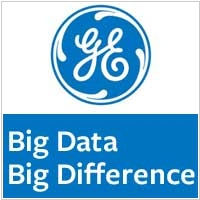
In the previous year, General Electric (GE) embarked on a significant investment of $105 million in the Big Data platform known as Pivotal. Currently, GE is actively implementing the powerful big data analytics capabilities provided by Pivotal, both internally and for customers who purchase its jet engines. To establish its analytics infrastructure, GE utilized Pivotal's Big Data Suite in conjunction with EMC's appliances, initially focusing on its aviation group. Within a span of 90 days, GE successfully established this capability and expanded its usage to 25 airline customers, granting them access to extensive data and analytics resources. Through the aggregation of data from approximately 15,000 flights, GE acquired 14 GB of information per flight, which could be efficiently analyzed within a reasonable timeframe. By employing traditional methods, processing the required data to identify a maintenance issue would have taken approximately 30 days. However, with the integration of Pivotal's technology, GE can now conduct substantial analytical operations in just 20 minutes.
2010. Windows Azure is already sold in boxes
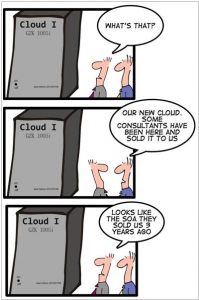
Though there is a big deal of debates around the "private cloud" term (if it's correct to call own data center, optimized with virtualization technology, a "cloud") - no one can deny that these things called "private cloud" are already selling well. The fact is that many companies are still not ready to move their IT infrastructures to public cloud platforms like Amazon EC2 and Windows Azure. But when they are told that "you can take the advantage of Cloud Computing (cost-efficiency, scalability) without any risk for data security, because the cloud will be locked in your office" - they like this. Obviously, private clouds are the necessary intermediate stage of transition companies to "real clouds" and cloud providers have to take a step back so that the process started. So it was with Microsoft. ***

